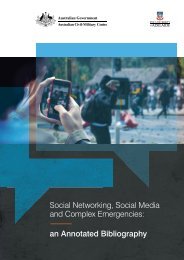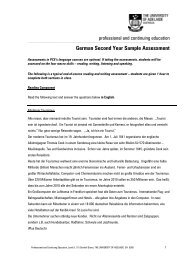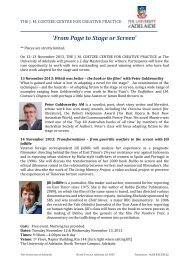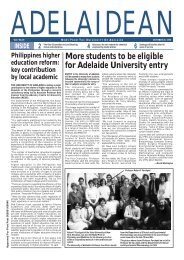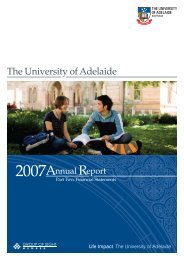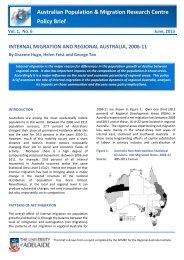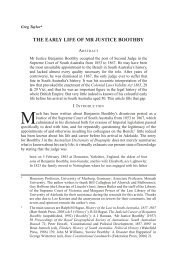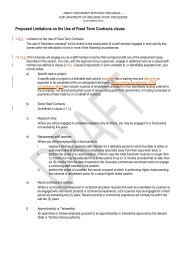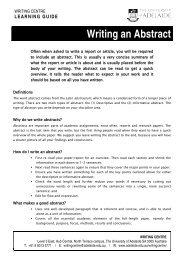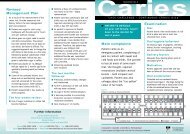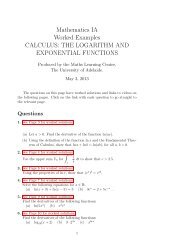Unbridling the Tongues of Women - The University of Adelaide
Unbridling the Tongues of Women - The University of Adelaide
Unbridling the Tongues of Women - The University of Adelaide
You also want an ePaper? Increase the reach of your titles
YUMPU automatically turns print PDFs into web optimized ePapers that Google loves.
<strong>Unbridling</strong> <strong>the</strong> tongues <strong>of</strong> women<br />
<strong>The</strong> pamphlet ‘did not set <strong>the</strong> Torrens on fire’. 24 It might have attracted more<br />
attention had she lived fur<strong>the</strong>r east: <strong>the</strong> Argus discussed Mill and Hare on <strong>the</strong> representation<br />
<strong>of</strong> minorities in 1861, and in 1862 a proportional representation bill was<br />
passed by both houses <strong>of</strong> parliament in New South Wales, but was not implemented<br />
because <strong>the</strong> government resigned. 25 However colonists in South Australia saw no<br />
need to seek moral and intellectual elevation by changing <strong>the</strong> electoral law. With <strong>the</strong><br />
ballot inhibiting electoral bribery <strong>the</strong>y may not have considered such elevation wanting.<br />
Nor did <strong>the</strong>y find it necessary to take special measures to secure electoral equality.<br />
Districts based, more or less, on population, and multiple electorates, already<br />
provided a semblance <strong>of</strong> equality. Moreover, <strong>the</strong>y seemed safe from any tyranny by a<br />
majority. Even in <strong>the</strong> Assembly returned after <strong>the</strong> Political Association’s efforts, <strong>the</strong>re<br />
was no consistent majority. 26<br />
Emily Clark sent copies <strong>of</strong> Spence’s pamphlet to <strong>the</strong> English relatives and to<br />
Henry Parkes asking him to give it to J. S. Mill. <strong>The</strong> English relatives and <strong>the</strong>ir<br />
friends responded: Spence received compliments from Hare, Mill, Rowland Hill<br />
and Pr<strong>of</strong>essor Craik, and <strong>the</strong>y welcomed her when she visited London in 1865.<br />
Describing her visit to England she boasted, ‘It was <strong>the</strong> little pamphlet ra<strong>the</strong>r than<br />
<strong>the</strong> novels that procured me introductions into <strong>the</strong> best society, or what I call <strong>the</strong><br />
best, <strong>the</strong> most intelligent in London’. 27 That included both Thomas Hare and John<br />
Stuart Mill. <strong>The</strong> friendship extended to her by Hare and his family added personal<br />
loyalty to her enthusiasm for proportional representation. Hare’s concurrence with<br />
her insistence that proportional representation made manhood suffrage both safe<br />
and desirable allowed her to boast: ‘I took this reform more boldly that Mr Mill …<br />
I was prepared to trust <strong>the</strong> people’. 28 Mill’s courteous interest in what she could tell<br />
him about South Australia, and his earnest advocacy <strong>of</strong> women’s suffrage, in <strong>the</strong>ir<br />
one conversation, suggests that he was impressed with Spence more for her potential<br />
value in <strong>the</strong> struggle for <strong>the</strong> rights <strong>of</strong> women than with her urgency for proportional<br />
representation. 29 Spence was not, she maintained, to be distracted. Perhaps she was<br />
more so than she was prepared to acknowledge later in her life; she did little more<br />
for her cause for over a quarter <strong>of</strong> a century.<br />
She did not lack occasion. In 1871, Glyde, as a member <strong>of</strong> a select committee on<br />
electoral districts, again raised <strong>the</strong> question <strong>of</strong> proportional representation <strong>of</strong> minorities.<br />
In 1872 a bill proposing proportional representation with <strong>the</strong> single transferable<br />
vote was introduced in <strong>the</strong> House <strong>of</strong> Commons. In 1880 one <strong>of</strong> <strong>the</strong> members for<br />
Burra made a plea for <strong>the</strong> Hare system <strong>of</strong> representation during debates on ano<strong>the</strong>r<br />
126



